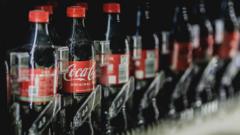In light of President Trump's aluminium tariffs, Coca-Cola may move towards plastic packaging, impacting sustainability efforts and raising environmental scrutiny.
Coca-Cola Considers Increased Plastic Use Amidst Trump Tariffs

Coca-Cola Considers Increased Plastic Use Amidst Trump Tariffs
Coca-Cola's CEO indicates a potential shift to more plastic bottles as aluminium tariffs rise, sparking environmental concerns.
Coca-Cola is contemplating an increase in the use of plastic bottles in the US market if the tariffs imposed by President Donald Trump on aluminium drive up the costs of aluminium cans. During a recent investor call, the company's CEO James Quincey explained that the beverage giant might need to adapt its packaging strategy in response to the import tax, which is set at 25% on all steel and aluminium entering the United States.
This tariff decision is expected to inflate the prices of canned beverages, compelling Coca-Cola to potentially pivot back to plastic bottles. The move comes amidst ongoing scrutiny from environmental advocates, who have branded Coca-Cola the "top global plastic polluter" for six years consecutively. In December, the company had already adjusted its sustainability targets, reducing the commitment to use 50% recycled materials in its packaging by 2030 to a new goal of 35% to 40% by 2035.
Quincey acknowledged the challenge presented by rising packaging costs but emphasized the company's diverse packaging portfolio, stating, "If one package suffers some increase in input costs, we continue to have other packaging offerings that will allow us to compete in the affordability space." The CEO suggested that should aluminium prices surge, Coca-Cola could enhance its reliance on PET plastic bottles.
In the past years, the company has favored aluminium containers, aligning with its sustainability messaging, owing to their recyclability advantages. Aluminium cans, despite their higher cost in packaging, are recognized for being significantly more recycable compared to plastic bottles.
According to the United States Geological Survey, nearly half of the aluminium consumed in the US is imported, implying that the new tariffs could lead to a noticeable spike in can pricing. Since the original tariffs initiated in 2018, numerous can manufacturers successfully secured "exclusions" from these import taxes, but the new regulations lack flexibility, eliminating exceptions for specific countries or products.
In addition, Trump's recent executive order, which cancels a prior initiative aimed at replacing plastic straws with paper alternatives, has also contributed to rising concerns about plastic pollution. This repeal reverses an earlier measure implemented by former President Joe Biden, who recognized the issue of plastic waste as a significant environmental crisis.





















